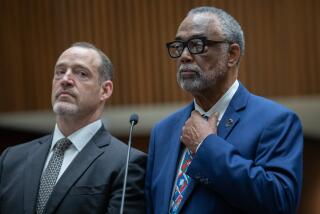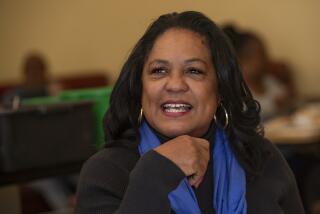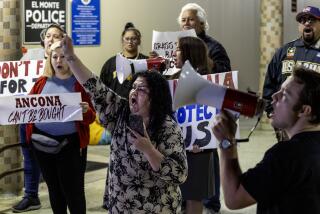Great Read: A Baldwin Park gadfly the mayor would love to swat away
Paul Cook stood just a few feet away from his adversary inside the small-claims courtroom in Alhambra.
Baldwin Park Mayor Manuel Lozano towered over Cook, an attorney and activist — and, in the politician’s view, an unrelenting critic with no sense of boundaries. The mayor stood silently, twiddling his thumbs behind his back, as Cook laid out his case.
The mayor, Cook alleged, had filed a temporary restraining order against him last summer to thwart lawsuits and deprive him of his right to freely express himself.
Not so, Lozano insisted. The mayor said he filed the order after he became concerned for his safety because of Cook’s aggressiveness.
“He has come to City Hall to expose my background, my addresses, my Social Security, including family and relatives’ addresses,” Lozano alleged, adding that Cook even wrote about his bankruptcy on his blog. “He literally knows every aspect of my personal life.”
Los Angeles County Superior Court Commissioner Bruce Mitchell turned to Cook for a response.
“I have every right to publish that he’s a bankrupted security guard on my blog,” Cook said. “It’s distasteful to some, but he’s a public official and this shows how much disdain he has for the publication of free information.”
::
Guardedly respected, tolerated or quietly disliked by elected officials sitting behind the dais, local gadflies are part of the political landscape, from city halls to water districts.
Like the Santa Ana winds, they show up faithfully and bring heat to often staid public meetings. Some dress in business attire; one activist in L.A. wears a dollhouse on his head. During one Metropolitan Transportation Authority meeting last year, a frequent speaker wore a shirt with a four-letter profanity printed on it in large capital letters. When he was asked to remove it, he started to take off all his clothes.
For all the verbal fireworks they bring, however, the gadflies who haunt public meetings can also be vigilant, occasionally bringing a serious issue to light.
Whether that was the case in Baldwin Park is a matter of dispute — at least between Cook and the mayor.
The issue was brought before the court by Cook, who alleged that Lozano had filed the restraining order with one basic purpose: to shut him up. On this day, Mitchell, the commissioner, would allow the two men to make their last arguments before reaching a decision.
The Baldwin Park case was unusual in that it was taking place in a small-claims courtroom, but similar conflicts have played out across the country, from Georgia to Los Angeles City Hall. The underlying question: Was this a case of an activist going too far in exercising his right to expression, or of a politician going too far to dampen it?
Save for extreme instances of inappropriate behavior and speech — such as threats — the law generally sides with protecting speech, said Eugene Volokh, a UCLA law professor familiar with the Baldwin Park case. That would cover speech that is obnoxious, displeasing or even odious.
“They’re entitled to be aggressive in terms of asking tough questions,” he said. “When it comes to ordinary citizens, it’s easy to say, ‘Stop trying to email me, stop talking to me,’ but when someone is a government official, the bar for that is a lot higher.”
Government agencies have been at the center of controversies when elected officials have tried to limit people’s comment time, saying that it would help maintain order during public meetings. Last year, the MTA board in Los Angeles revised its policy to restrict the time that a citizen is allowed to speak to about six minutes: three minutes during general public comment and up to three minutes on items on which the board will vote.
Last February, two men who were often kicked out of L.A. City Council meetings for violating such rules won a free-speech lawsuit. A federal judge ruled that the city had repeatedly ran afoul of the 1st Amendment when it enforced its rules of decorum, cutting off or ejecting the activists from meetings dating as far back as 2009.
::
Cook, 32, said he doesn’t see himself as a gadfly, but as a concerned citizen whose activism was awakened by wrongs he believe public officials were committing.
“I just have words, so writing and holding them accountable is all I can do,” he said.
The child of Korean immigrants, Cook said his father wanted him to become a lawyer or a doctor. After earning his undergraduate degree from UCLA in 2004, he moved to New Zealand to work and do some soul-searching.
“You’re either going to make a difference by healing people as a doctor or you’re going to make changes that impact society as a lawyer,” he recalled telling himself. He chose the latter.
By 2009, Cook had returned to Los Angeles and attended UCLA’s law school. He graduated in 2012.
That year, he moved in with his parents in Baldwin Park to save money and study for the bar exam. He also joined a boxing club sponsored by the city.
A year later, after he passed the exam, the conflict with Baldwin Park’s government began.
When the boxing club lost some of its funding, Cook said he started investigating its financial problems. He began submitting public records requests and attending council meetings to pressure officials to respond to his inquiries.
Inspired by journalism, he also began documenting his fight on his blog, The Legal Lens.
“The City Council and management treated me like an annoying ‘gadfly’ that buzzed in their ear,” Cook said.
“They saw me as a gadfly, but I was more of a hornet.”
He said that when the city failed to provide documents, he filed a pair of lawsuits to obtain them.
The turning point came last summer, when Cook publicly criticized the director of the boxing program during a concert at a public park.
The mayor claimed in court that Cook’s statements were directed at him because he was addressing the crowd when Cook spoke out.
Mitchell asked Cook to give his side of the park incident.
“I said, ‘Boo! Boo! You’re a money launderer!’” Cook said. “Next thing I know, five police officers grabbed me and threw me out.”
He said the officers told him not to return. When he did, he was arrested and jailed.
Lozano told the commissioner that Cook, after he was released from jail, went to a restaurant he frequents to confront him about the arrest.
Cook said that he was at the restaurant to meet friends and that seeing the mayor had been coincidental.
Four days later, on the advice of the city attorney, the mayor filed the restraining order against Cook.
A Los Angeles County Superior Court judge denied Lozano’s application on July 29 but warned Cook to keep his distance.
Later that day, Cook sent an email to council members and the boxing director with a link to his blog story about his victory. The subject line read: “Eat it!”
Robert Tafoya, Baldwin Park’s city attorney, responded with a cease-and-desist note.
“If you continue these unnecessary, harassing and offensive emails, you will force me to go back into court,” he wrote in part.
::
Back in the small-claims courtroom, Mitchell made his initial ruling: against Cook.
After the decision, Mayor Lozano walked out but returned to the courtroom. He asked the bailiff if he could be escorted out.
“They’re starting to harass me again,” he said of Cook and his supporters.
Outside, in the hallway, Cook said he felt disappointed but happy to have made his case.
“Small claims gives claws to the weak,” he said. “The strongest message the judge sent — even though he didn’t state it in the opinion — was that the court can review a mayor’s misconduct and it can hold him accountable.”
Twitter: @latvives
Times staff writer Laura Nelson contributed to this report.
More to Read
Start your day right
Sign up for Essential California for news, features and recommendations from the L.A. Times and beyond in your inbox six days a week.
You may occasionally receive promotional content from the Los Angeles Times.







